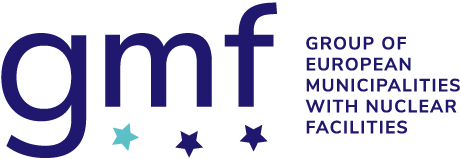Feedback from GMF members on the pluri-annual programme
This year GMF members were requested to provide their feedback on their main concerns regarding the different phases of the nuclear life cycle as well as the way GMF could help them to address these concerns. Belgium, Hungary, Slovenia, Spain, Sweden, the Netherlands and the UK provided responses which are summarised below:
- Concerns regarding nuclear new build: Some GMF members are interested in having further information on new investments and new technologies in the nuclear sector, as they see nuclear as a necessary component in the future energy mix to fight against climate change and their sites might be an option for constructing new reactors. Another area of interest in some municipalities, particularly in the UK, is small modular reactors (SMRs).
- Concerns regarding operating nuclear power plants: Safety issues, competence building and long-term skills provision are important aspects during the operation of nuclear power plants.
- Concerns regarding decommissioning: GMF members would like to have more information about the status of decommissioning in different Member States and how social, environmental and economic impacts on communities are taken into account. Long term skills provision is important for addressing decommissioning in the near future.
- Concerns regarding radioactive waste management: Safety is of great importance during the operations in radioactive waste management facilities. In this regard, openness and transparency from all parties concerned as well as stakeholder engagement is essential in order to build trust.As there are already solutions in place for low level radioactive waste in most countries in Europe, GMF members would be interested to learn more about managing high level waste, including storage, reprocessing, etc. Socio-economic development associated with radioactive waste management facilities is also an issue of interest for some members.In the case of Sweden, where the national government should take a final decision regarding the site for a final repository for high level radioactive in Östhammar, the local level is especially concerned about the financial responsibility for the high-level waste after closure.In the UK, NuLeAF is mainly concerned about legacy wastes.
Other areas of importance
In the case of Sweden, the Swedish Organisation for Municipalities with Nuclear Facilities (KSO) also raised the concerns of municipalities regarding electricity provision and the capacity in the national and European electricity grid. Power supply to municipalities and industry located in their geographical area has become an increased problem in Sweden and the municipalities affected are trying to address the national governmental level. The regulatory body, the Swedish Power Grid Authority, is a state-owned enterprise. They are responsible for ensuring that Sweden’s transmission system for electricity is safe, environmentally sound and cost effective. After the planned closure of 4 Swedish NPPs located in the south of Sweden this has become a main issue for municipalities and industry who fear that power failure and black outs can affect society and outage/interruption in the industry production.
Role of GMF in addressing concerns
According to the members, GMF plays an important role for the local level as it is the voice of the local level in nuclear issues and nuclear emergency issues.
GMF provides opportunities for:
- Sharing good practices on nuclear governance from Europe and internationally through meeting, workshops and country visits;
- Sharing lessons learned and updating information about new build, operating nuclear power plants, decommissioning and radioactive waste management in the different member countries;
- Establishing working groups with municipalities in similar situations with radioactive waste management facilities (e.g. European Network of radioactive Waste Dialogue ENWD ) or with experience in decommissioning (e.g. site clean up and approaches to socio-economic development)
- Organising meetings with experts at European and international level (e.g. to share recommendations of the IAEA, OECD/NEA, European Commission and European Parliament) on issues of interest;
- Representation of local interests in the nuclear arena at European level through the European Nuclear Energy Forum (ENEF);
- Interaction with European institutions, governments, industry and different stakeholders at European level.
